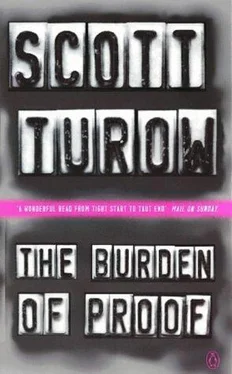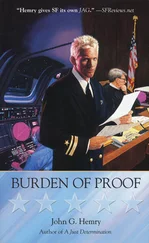Scott Turow - The Burden of Proof
Здесь есть возможность читать онлайн «Scott Turow - The Burden of Proof» весь текст электронной книги совершенно бесплатно (целиком полную версию без сокращений). В некоторых случаях можно слушать аудио, скачать через торрент в формате fb2 и присутствует краткое содержание. Жанр: Детектив, на английском языке. Описание произведения, (предисловие) а так же отзывы посетителей доступны на портале библиотеки ЛибКат.
- Название:The Burden of Proof
- Автор:
- Жанр:
- Год:неизвестен
- ISBN:нет данных
- Рейтинг книги:3 / 5. Голосов: 1
-
Избранное:Добавить в избранное
- Отзывы:
-
Ваша оценка:
- 60
- 1
- 2
- 3
- 4
- 5
The Burden of Proof: краткое содержание, описание и аннотация
Предлагаем к чтению аннотацию, описание, краткое содержание или предисловие (зависит от того, что написал сам автор книги «The Burden of Proof»). Если вы не нашли необходимую информацию о книге — напишите в комментариях, мы постараемся отыскать её.
The Burden of Proof — читать онлайн бесплатно полную книгу (весь текст) целиком
Ниже представлен текст книги, разбитый по страницам. Система сохранения места последней прочитанной страницы, позволяет с удобством читать онлайн бесплатно книгу «The Burden of Proof», без необходимости каждый раз заново искать на чём Вы остановились. Поставьте закладку, и сможете в любой момент перейти на страницу, на которой закончили чтение.
Интервал:
Закладка:
"I am home, Peter. I cannot answer your questions now.
Please do as I ask. I cannot attend to this alone." He hung up the phone abruptly. His hands were trembling and he leaned once more against the laundry basin. He had seemed so coldly composed only an instant before. Now someterrible sore element in him was on the rise.
He presumed he was about to faint. He removed his tie first, then his jacket. He returned for an instant to the garage door; but he could not push it open. If he waited, just a moment, it seemed he would understand.
The house was soon full of people he did not know'. The police came first, in pairs, parking their cars at haphazard angles in the drive, then the paramedics and the ambulance. Through the windows Stern saw a gaggle of his neighbors gathering on the lawn across the way. They leaned toward the house with the arrival of each vehicle and spoke among themselves, held behind the line of squad cars with their revolving beacons. Within the house, policemen roamed about with their usual regrettable arrogance. Their walkietalkies blared with occasional eruptions of harsh static.
They went in and out of the garage to gawk at the body and talked about events as if he were not there. They studied the Sterns' -rich possessions with an envy that was disconcertingly apparent.
The first cop into the garage had lifted his radio to summon the lieutenant as soon as he emerged.
"She's cooked," the officer told the dispatcher. "Tell him he better come with masks and gloves." Only then did he notice Stern lurking in a fashion in the dark hall outside the laundry room. Abashed, the policeman began at once 'to explain. "Looks like that car run all day. It's on empty now.
Catalytic converter gets hotter than a barbecue-six, seven hundred degrees. You run that engine twelve hours in a closed space, you're generating real heat. That didn't do her any good. You the husband?"
He was, said Stern.
"Condolences," said the cop. "Terrible thing." They waited.
"'Do you have any idea, Officer, what occurred?" He did not know what he thought just now, except that it would be a kind of treachery to believe the worst too soon. The cop considered Stern in silence. He was ruddy and thick, and his weight probably made him look older than he was.
"Keys in the ignition. On position. Garage door's closed."
Stern nodded.
"It dudn't look like any accident to me," the cop said finally. "You can't be sure till the autopsy. You know, could be she had a heart attack or somethin right when she turned the key.
"Maybe it's one of them freak things, too," the cop said.
"Turns the car on and she's thinkin about somethin else, you know, fixin her hair and makeup, whatever. Sometimes you never know. Didn't find a note, right?"
A note. Stern had spent the moments awaiting the various authorities here in this hallway, keeping his stupefied watch beside the door. The thought of a note, some communication, provided, against all reason, a surge of hope.
"You'd just as well stay out of there," the policeman said, gesturing vaguely behind him.
Stern nodded with the instruction, but after an instant he took a single step forward.
"Oncemore," he said.
The policeman waited only a moment before opening the door.
He was known as Sandy, a name he had adopted shortly after his mother and sister and he had arrived here in 1947, driven from Argentina by unending calamities-the death of his older brother, and then his father; the rise of Peren.
It was his mother who had urged him to use this nickname, but he was never wholly at ease with it. There was a jaunty, comic air to the name; it fit him poorly, like someone else's clothing, and, therefore, seemed to betray all that helpless immigrant yearning for acceptance which he so ardently sought to conceal, and which had been in truth perhaps his most incorrigible passion.
To be an American. Having come of age here in the 1950s, he would always hear the whisper of special obligations in the word. He had never bought a foreign car; and he had forsaken Spanish years ago.
Occasionally, in surprise, a few words, a favored expression might escape him, but he had arrived here determined to master the American tongue.
In his parents' home there was no single language-his mother addressed them in Yiddish; with each other, the children used Spanish; his father talked principally to himself in windy high-flown German, which sounded to Stern as a child like some rambling machine. In Argentina, with its deep Anglophile traditions, he had learned to speak the English of an Eton schoolboy. But here the idioms of everyday life flashed in his mind like coins, the currency of real Americans. From the first, he could not bear to use them. Pride and shame, fire and ice, burned away at him always; he could not endure the sniggering that seemed to follow even the slightest accented misuse. But in his dreams he spoke a rich American argot, savory as any jazzman's.
American optimism, on the other hand, he had never absorbed. He could not leave aside the gloomy lessons of foreign experience, of his parents' lives-emigrants, exiles, souls fleeing despots, never at rest.
Certain simple propositions he took as articles of faith: things would often turn out badly. Seated in the living room in an overstuffed chair, amid Clara's raiku vases and Chinese tapestries, he accepted this like the coming true of an evil spell. He had the inkling of various tasks that were somehow imperative, but for the time being he had no thought to move; his limbs were weak from shock, and his heart seemed to labor.
Peter arrived not long after the paramedics. They had already rolled their White-sheeted cart into the garage to remove the body Wiry and always intense, Peter had burst into the house, disregarding the policemen at the front door. Why was it, Stern wondered, that he was so appalled by his son's hysteria, this hyperthyroid look of uncontrollable panic? Peter?was immaculately kempt, a bonethin young man with a highly fashionable hairdo. He wore a blousy French shirt with broad turquoise stripes; his pants were olive, but of a style never worn in any army, ballooning widely near the knee. Stern, even now, could not restrict a critical impulse. It was remarkable, really, that this man whose face was rigid with distress had taken the time to dress.
Rising finally, he encountered his son in the hallway leading from the foyer to the kitchen.
"I just can't believe this." Peter, like Stern, seemed to have no idea how to behave; he moved a single step toward his father, but neither man reached out. "My God," he said, "look at it. It's a carnival outside.
Half the neighborhood's there."
"Do they know what happened?"
"I told Fiona CawIcy." The Cawleys had lived next door to the Sterns for nineteen years. "She more or less demanded it. You know how she is."
"Ah," Stern said. He battled himself, but he found that a selfish shame, juvenile in its intensity, struck at him.
This terrible fact was out now, news now, known. Stern could see the canny deliberations taking place behind Fiona Cawley's deadly yellow eyes.
"Where is she'?." Peter demanded. "Is she still here?"
As soon as Peter had gone off to the garage, Stern recalled that he had meant to speak with him about calling his sisters.
"Mr. Stern?" The policeman ho had gone into the garage was standing there. "Couple of fellas wanted a word, if you don't mind."
They were in Stern's first-floor den, a tiny room that he kept largely to himself. Clara had painted the walls hunter green and the room was crowded with furniture, including a large desk on which certain household papers were carefully laid. It disturbed Stern to see the police stationing themselves in this room which had always been his most private place. Two policemen in uniform, man and a woman, stood, while a plainclothes officer occupied the sofa. This third one, a detective apparently, rose disorderly to offer his hand.
Читать дальшеИнтервал:
Закладка:
Похожие книги на «The Burden of Proof»
Представляем Вашему вниманию похожие книги на «The Burden of Proof» списком для выбора. Мы отобрали схожую по названию и смыслу литературу в надежде предоставить читателям больше вариантов отыскать новые, интересные, ещё непрочитанные произведения.
Обсуждение, отзывы о книге «The Burden of Proof» и просто собственные мнения читателей. Оставьте ваши комментарии, напишите, что Вы думаете о произведении, его смысле или главных героях. Укажите что конкретно понравилось, а что нет, и почему Вы так считаете.












